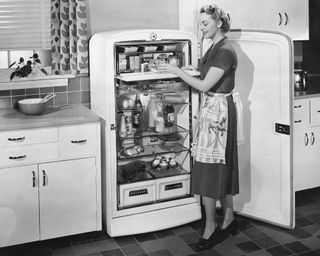Who Invented the Refrigerator? | Live Science
Curated from: livescience.com
Ideas, facts & insights covering these topics:
5 ideas
·2.66K reads
1
Explore the World's Best Ideas
Join today and uncover 100+ curated journeys from 50+ topics. Unlock access to our mobile app with extensive features.
The history of refrigeration
Refrigeration is the action of creating cooling conditions by removing heat. It is used for preserving food by slowing bacteria growth.
- Around 1000BC, the Chinese used to cut and store ice.
- Five hundred years later, the Egyptians and Indians left earthenware pots out during cold nights to make ice.
- In the 17th century, it was found that saltpeter dissolved in water creates cooling conditions.
- In the 18th century, Europeans collected ice in winter, salted it, wrapped it in flannel, and stored it underground for months. Ice was even shipped around the world.
- People also used cool cellars or placed goods underwater.
- Others built ice boxes out of wood, lined with tin or zinc, and insulated with cork, sawdust, or seaweed, and filled with snow or ice.
88
861 reads
Evaporative cooling
- 1720s. Scottish doctor William Cullen saw that evaporation had a cooling effect.
- 1748. Cullen demonstrated his ideas by evaporating ethyl ether in a vacuum.
- 1805. Oliver Evans designed a refrigeration machine that used vapor instead of liquid.
- 1820. English scientist Micahel Faraday used liquefied ammonia for cooling.
- 1835. Jacob Perkins, who worked with Evans, patented a vapor-compression cycle using liquid ammonia.
- 1842. John Gorrie, an American doctor, built a machine similar to Evans's design to artificially create ice and cool down patients with yellow fever.
- New and improved refrigeration ideas continued to be developed, including Albert Einstein's idea of an environmentally friendly refrigerator with no moving parts that did not rely on electricity.
- By 1920, refrigerators were considered essential in American homes.
76
480 reads
How refrigerators work
Refrigerators today work by evaporating liquids.
The liquids are pushed through the refrigerator through tubes and begin to vaporize. As the liquids evaporate, they carry heat away with them as the gases travel to a coil outside the refrigerator. Here the heat is released. The gases return to a compressor, where they become liquid again, restarting the cycle.
79
467 reads
Refrigerator safety
- The first refrigerators contained flammable, toxic, and highly reactive liquids and gasses.
- Most refrigerators use hydrofluorocarbons (HFCs), which are safer than Chlorofluorocarbons (CFCs). CFCs are known to be harmful to the ozone layer.
- Refrigerators should be set at a maximum of 40 degrees Fahrenheit (4.4 degrees Celsius) to prevent food contamination.
75
406 reads
Refrigerators of the future
New technologies in refrigeration include solid-state refrigerators and refrigerators that use magnets.
- Solid-state refrigerators use the refrigerator's entire surface to slowly get rid of the heat. Solid-state refrigerators are also free from harmful materials and loud operations.
- Refrigerators that use magnets provide a vibration-free, silent, environmentally friendly refrigerator. It uses a magnetocaloric heat pump (using a material that heats up in a magnetic field and cools down when it is not) with water-based coolant. It also uses up to 35 percent less power than traditional refrigerators.
80
449 reads
IDEAS CURATED BY
Camille A.'s ideas are part of this journey:
Learn more about health with this collection
How to set achievable goals
How to prioritize self-care
How to create healthy habits
Related collections
Similar ideas
5 ideas
4 Myths About Juice Cleansing | Live Science
livescience.com
3 ideas
1 idea
Why Is the Ocean Salty? | Salt in the Ocean | Live Science
livescience.com
Read & Learn
20x Faster
without
deepstash
with
deepstash
with
deepstash
Personalized microlearning
—
100+ Learning Journeys
—
Access to 200,000+ ideas
—
Access to the mobile app
—
Unlimited idea saving
—
—
Unlimited history
—
—
Unlimited listening to ideas
—
—
Downloading & offline access
—
—
Supercharge your mind with one idea per day
Enter your email and spend 1 minute every day to learn something new.
I agree to receive email updates

